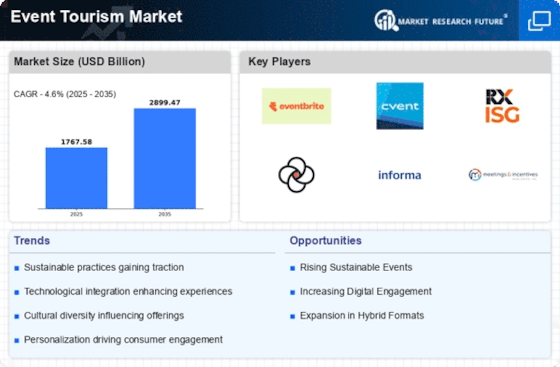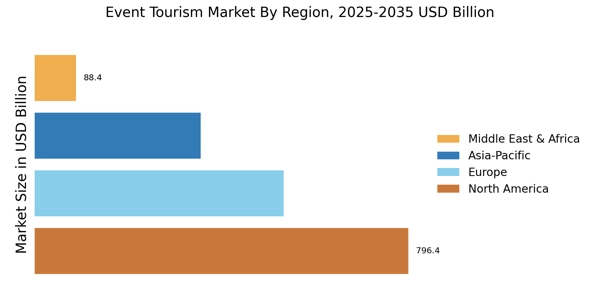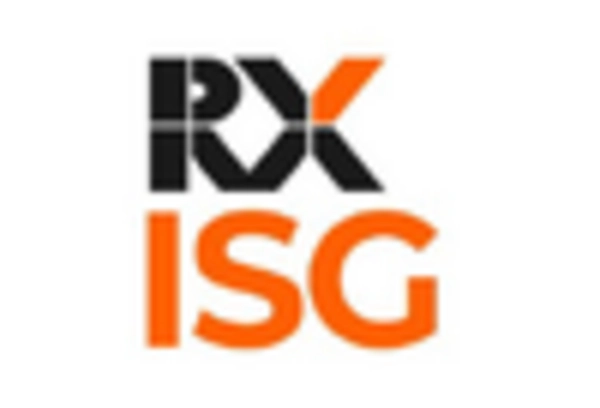Increased Disposable Income
The rise in disposable income among consumers appears to be a pivotal driver for the Event Tourism Market. As individuals experience greater financial freedom, they are more inclined to spend on travel and leisure activities, including attending events. This trend is particularly evident in emerging economies, where a burgeoning middle class is increasingly seeking unique experiences. According to recent data, the average household income has seen a steady increase, which correlates with higher spending on tourism-related activities. This financial capability enables consumers to travel for events such as music festivals, sports competitions, and cultural exhibitions, thereby propelling the growth of the Event Tourism Market. The willingness to invest in memorable experiences suggests a robust potential for future expansion in this sector.
Rise of Experiential Travel
The rise of experiential travel is a notable driver for the Event Tourism Market, as travelers increasingly seek immersive experiences rather than traditional sightseeing. This shift in consumer preferences has led to a surge in demand for events that offer unique, hands-on activities. Data shows that experiential travel has grown by over 60% in recent years, with travelers prioritizing events that allow them to engage with local cultures and communities. This trend is particularly evident in sectors such as culinary tourism, adventure sports, and wellness retreats, where participants are drawn to events that provide authentic experiences. The Event Tourism Market stands to benefit from this growing inclination towards experiential travel, as it aligns with the desire for meaningful connections and memorable adventures.
Government Support and Investment
Government support and investment play a crucial role in the development of the Event Tourism Market. Many governments recognize the economic benefits of hosting events, leading to increased funding and resources allocated to tourism initiatives. This support often manifests in the form of infrastructure development, marketing campaigns, and incentives for event organizers. Recent data indicates that countries investing in event tourism have experienced a 20% increase in visitor numbers, highlighting the positive impact of such initiatives. Additionally, government-backed events often attract international attention, further enhancing a destination's profile. This strategic investment not only stimulates local economies but also positions the Event Tourism Market as a vital component of national tourism strategies, fostering long-term growth and sustainability.
Cultural Exchange and Globalization
Cultural exchange, driven by globalization, significantly influences the Event Tourism Market. As societies become more interconnected, there is a growing interest in experiencing diverse cultures through events. This phenomenon is reflected in the increasing number of international festivals and conferences that attract attendees from various backgrounds. Data indicates that cultural events, such as art fairs and culinary festivals, have seen a rise in participation, with many cities positioning themselves as cultural hubs. This trend not only enhances the visibility of local cultures but also fosters economic growth through tourism. The Event Tourism Market benefits from this cultural exchange, as it encourages travelers to explore new destinations while participating in unique events, thereby creating a symbiotic relationship between tourism and cultural appreciation.
Technological Advancements in Event Management
Technological advancements are reshaping the Event Tourism Market, offering innovative solutions for event management and attendee engagement. The integration of technology, such as mobile applications and virtual reality, enhances the overall experience for participants. For instance, event organizers are increasingly utilizing data analytics to tailor experiences to attendee preferences, leading to higher satisfaction rates. Moreover, the rise of online ticketing platforms has simplified the purchasing process, making it more accessible for consumers. Recent statistics suggest that events leveraging technology see a 30% increase in attendance compared to those that do not. This trend indicates that as technology continues to evolve, it will play a crucial role in driving the growth of the Event Tourism Market, making events more interactive and engaging for attendees.
.png)

















